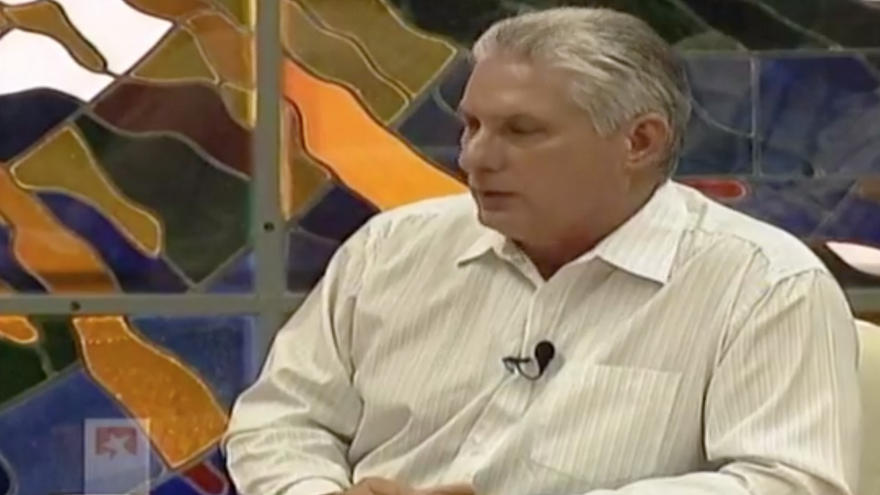
![]() 14ymedio, Havana, September 11, 2019 — President Miguel Díaz-Canel spoke this Wednesday about the problems with the arrival of fuel to Cuba that are affecting the day to day life of the Island, although he ruled out that it is a second Special Period, similar to the crisis of the 90s that left a traumatic memory among Cubans.
14ymedio, Havana, September 11, 2019 — President Miguel Díaz-Canel spoke this Wednesday about the problems with the arrival of fuel to Cuba that are affecting the day to day life of the Island, although he ruled out that it is a second Special Period, similar to the crisis of the 90s that left a traumatic memory among Cubans.
In a television appearance transmitted by several channels, the leader alluded to the complex energy situation the country is experiencing, although he avoided using the word “crisis” and assured that after the arrival of a ship with petroleum, on September 14, the tension will be relieved, but he pointed out that he wasn’t going to say “where it comes from.”
For several days complaints and reports about an abrupt fall in the number of buses circulating through the country reached social media. Images of people waiting for hours at bus stops, and popular rumors of a possible economic collapse similar to the one a quarter century ago, multiplied.
“It’s a temporary situation and we want the population to have all the elements,” clarified Díaz-Canel, who attributed the problem to the worsening of pressures by the American administration on the Island. “’They want to ’cut off our light and air,’ as we say in good Cuban,” he added.
After the arrival of the oil ship on the 14th, new shipments will not reach the Island until the end of September, so “adjustment and savings measures” must be taken so that the fuel that comes this week “lasts until” more arrives at the end of the month. “We are going to work with the fuel that has already entered the economy,” insisted Díaz-Canel.
To dispel fears of a lack of food like the one that occurred at the beginning of this year, Díaz-Canel said that “the issue is essentially energy, with some related to fuel, and for that reason we are going to explain the impacts. It’s not a shortage, we have food at the ports.”
“This scenario obligates us to take measures to get out of this temporary situation, to minimize the impact on prioritized services and optimize the use of fuel,” he detailed.
In recent days some companies have been forced to cut transport services for their employees in face of the low availability of fuel. In his appearance the leader called on drivers of state cars* to stand in solidarity. “All state cars must stop at the stops,” and pick up people waiting for a bus, especially at rush hour.
“We have to take satisfactory experiences applied in the Special Period when it comes to solutions for transportation,” warned Díaz-Canel, who recalled the changes in working hours that were imposed in those years and called for a “leveling” of electric spikes to avoid excess demand at the times of greatest usages of energy in the residential sector.
The formula most repeated by the leader to get out of the crisis was appealing to savings, sensitivity, and popular vigilance. Díaz-Canel called on the population to be alert so that no one speculates, hoards, or raises prices.
Díaz-Canel tried to calm the popular mood and reminded that Cuba produces 40% of its needs in petroleum, and ruled out possible “blackouts” ahead of the new fuel shipment next Sunday. The minister of Economy and Finance, Alejandro Gil Hernández, also assured that the supply of liquified and natural gas is guaranteed until the end of the year.
The Economy minister called for a paralyzation of certain services that are not at the moment a priority in order to guarantee others that are essential. The official assured that they were going to guarantee activities that directly affect the wellbeing of the population, like the distribution of food and passenger transportation.
However, the minister of transport, Eduardo Rodríguez Dávila, announced that there will be adjustments in the train schedules and that “not everyone will be able to travel the day they want.” “We are going to readjust the departures of domestic trains, without canceling departures but we are going to space them out in time,” he asserted.
*Translator’s note: This kind of informal “ride sharing” is long-standing in Cuba, in the face of decades of limitations in passenger transport of all kinds.
Translated by: Sheilagh Herrera
__________________________
The 14ymedio team is committed to serious journalism that reflects the reality of deep Cuba. Thank you for joining us on this long road. We invite you to continue supporting us, but this time by becoming a member of 14ymedio. Together we can continue to transform journalism in Cuba.
